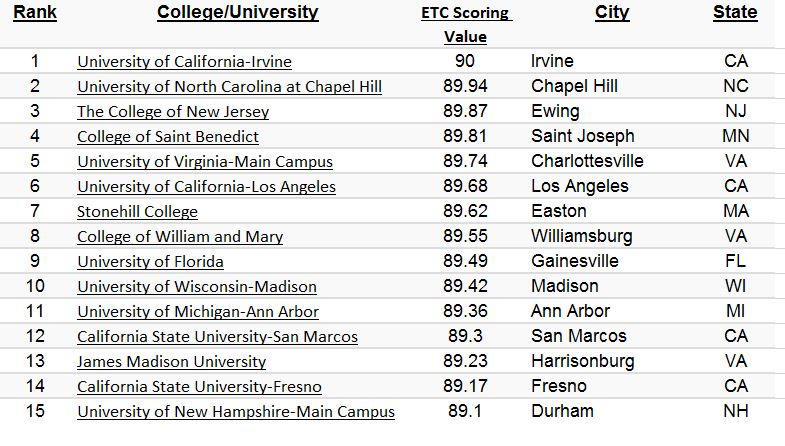ETC College Rankings Index for 2018
The 2018 edition of our ETC College Rankings Index determines the economic value added, by each college ranked within the system, which is the improvement in earnings and employability of college graduates – measured against the total cost of the education. According to Michael R. Havis, president and founder of Educate To Career, “Other ranking systems are ranking colleges based on the academic caliber of their entering students rather than on the value-added by the school. We are interested in how young people are substantively helped by attending a specific college.” The ETC College Rankings Index is the only system that rates colleges by the Economic Value Added delivered to their graduates. Our patent pending methodologies analyze the labor market outcomes of graduates from 1250 four-year colleges. The ETC College Rankings Index is comprised of accredited 4-year colleges, with annual enrollments greater than 800 students. The Index analyzes data for over 1,200 colleges, representing 97% of all students enrolled in 4-year colleges. Some of the metrics used in calculating the ETC College Rankings Index are:
The ETC College Rankings Index is found on the Educate to Career website |
- Top 15 Colleges
- Colorado colleges
- Florida colleges
- North Carolina colleges
- Texas colleges
Frequently Asked Questions from the ETC website
Why are your salary numbers substantially lower than what I’ve seen from other sources?
The salary values shown here are based on ALL graduates employed full time, within 1 year of graduation. Following is an example of the concept of our salary calculation methodology.
Example: ACME University had 6 people graduating with accounting degrees last year, 4 of whom are now working full time:
- 2 became accountants, earning $45,000
- 1 became a retail sales manager, earning $30,000
- 1 became a bartender, earning $20,000
The average salary for graduates of ACME University with accounting degrees is $28,750. This is in contrast to the typical practice of reporting the salaries of only those persons who became accountants. Most other systems would report $45,000.
I see a lot of state schools ranking highly in your system. Why is this?
Public, state run schools generally provide a very good education for an excellent price. The result being that many of these schools offer an excellent value relative to most other categories of colleges. Academic standards are uniformly high in most state schools and a relatively high percentage of their graduates enter the workforce successfully; with meaningful occupations and high relative salaries. Additionally, graduates from these state schools typically have low debt loads which translates ultimately to low loan default rates.
The impetus for our College Rankings Index is to provide reliable information that helps students develop successful careers with a low financial burden. Therefore, we encourage value conscious students and parents to strongly consider their in-state public college system. In almost all regions of the U. S., you have access to a very good education, at a heavily subsidized price.






